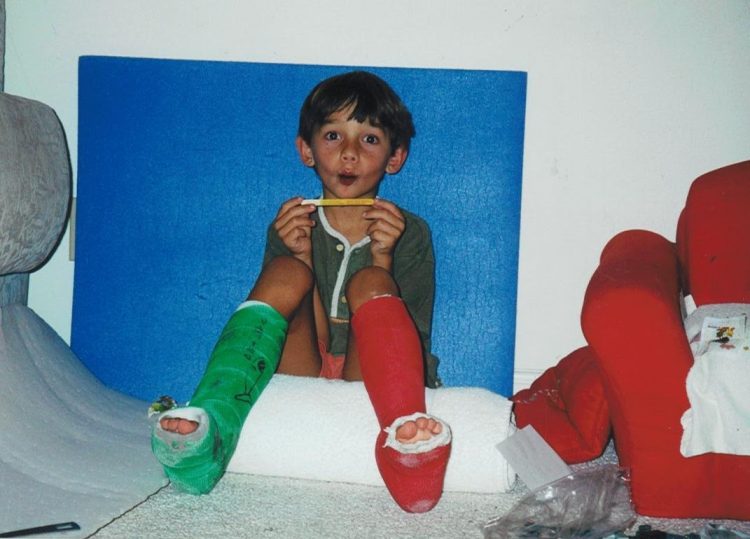To Those Searching for a Parenting 'Manual' for Their Kids With Rare Conditions
Last week I purchased a top-of-the-line, $4,000 LED Smart TV with enough options to bedazzle even the most technologically gifted. Some of the features were intuitive enough that I proudly disregarded the instruction manual altogether. To my dismay, I soon discovered that a good number of even the simplest functions were complicated, puzzling and downright impossible to comprehend even with the handy user’s manual.
Realizing my dependence on this pamphlet of how-tos, I reflected upon all the parenting guides I have purchased over the years, all dealing with every different aspect of the child imaginable: the terrible twos, sleeplessness, anxiety, positive discipline, the emotional lives of boys, tolerating teens, etc. The one book I have yet to come across is called the “The Manual: Raising Kids with Rare Conditions.” My instruction booklet was not included in my take-home packet from the hospital when Yohan was born 25 years ago, and I still fantasize about getting my hands on a copy of this yet non-existent source of knowledge.
Initially, I learned to care for my bundle of joy by asking questions, reading a selective few of those parenting books I mentioned above, taking advice from others (even if unsolicited) and relied heavily on my own maternal instincts. Through trial and error, my husband and I, as do most parents, strove to raise and nurture our child to be a resilient human being, who would hopefully be happy, successful, compassionate, friendly, confident, etc. None of these attributes are ever guaranteed, but parents can and do influence their children to a very large degree by modeling behaviors and values, including empathic listening, acceptance of the whole child, unconditional love, and positive discipline.
Born with unique dispositions and temperaments, every child will integrate what he or she witnesses, observes and experiences to form a personality, which is in a state of constant flux, molding to and shaped by the surrounding environment. Raising children is truly a humbling adventure, where perfecting parental skills comes through valiant efforts on the part of the father and/or mother to do the best they can at any given moment.
And just to keep us on our toes, life has this nasty habit of throwing wrenches into our well-thought-out and admirable plans and dreams, forcing us to change directions or reroute our individual and family’s journey throughout life over and over again.
For instance, when parents are told that their apparently healthy and precious child has a progressive neurological disease called Charcot-Marie-Tooth disease (CMT), or any other chronic illness or disability, the world as they knew it often comes to an abrupt halt. For a while, time just seems to stop as the shock of reality works its way through to the senses. With no current treatment or cure, CMT is a group of diseases whose effects vary greatly from one person to the next, even among members of the same family. The fear of an uncertain future for our beloved child creates a chaos so disruptive, parents may inevitably experience and re-experience a whole gamut of different feelings anywhere from grief, rage, disbelief, depression, anxiety, sadness, hopelessness, to guilt and disappointment. This flurry of unyielding and varied sets of emotions is unequivocally normal and expected in the face of such devastating and unwelcome news.
We immediately wonder what this diagnosis means for our child’s future – will she be able to play the piano, have children and fulfill her dreams as an actress? Will his legs remain strong, what about his basketball career, and just how much will my son be affected? Will he or she become more or less disabled than me, than my mother, than other family members? As concerned parents, we all have a tendency to get ahead of ourselves by asking a million questions about the fate of our children by continuously wondering and inquiring about what the future has in store, trying to predict what cannot be foreseen.
To top it off, in the midst of this news, unsettled parents must return home to their children, bearing news that will inevitably change the lives of every single member of that particular family. How hard it is to remain calm, in control, and at ease after your child’s diagnosis.
However, in these delicate situations, let’s not forget that children are savvy readers of parental anxiety, tension, and stress. They are inexorably influenced by our attitudes, opinions, and expressions as they learn a great deal about themselves by watching, listening and absorbing all the subtle messages left behind in conversations to be had both in public and in private. They definitely do not wish to see us saddened by their disease (even if we are) and need most of all to be comforted, supported and understood.
So, when a parent unintentionally acts out his or her intense sadness, despair and anxiety in front of their children, the child is sure to take it all in, every bit of it. If our children receive messages confirming that their own situation is hopeless and the future bleak, he or she will surely feel out of control and helpless in the face of upcoming and ongoing adversity. However, if our kids are met with reassurance and optimism, they will be more likely to cope adequately, if not conquer the intermittent hurdles that are bound to appear throughout their lives. So, the quicker we as parents learn to “deal effectively” with the challenges presented by CMT, the quicker our children will build the necessary coping skills and resilience to live well despite this disease.
Let me qualify the expression “dealing effectively with CMT” as an extremely subjective experience, which takes on a different meaning for each and every one of us. Coming to terms with your child’s progressive disease and limitations takes a lot of time and energy, and as you already know, this does not happen overnight, if ever at all.
There are still moments when I am angry at this disease and sometimes at moments of weakness think, “Why me?”, “Why him?”, “Why us?” I usually manage to calm down by focusing on what he can do, by living in the present moment and by appreciating the gifts of today. I also fervently practicing to replace my negative and catastrophic thoughts with a more positive and realistic perspective which encompasses a broader, less self-centered approach to challenging situations.
The brutal reality is that I cannot control his disease or make it go away. However, we as parents are far from powerless and impotent. On the contrary, by sharing an unwavering hope for the future, and role modeling coping mechanisms such as humor, optimism, and faith while remaining connected to others for support, we are fostering resiliency and courage in our children — traits on which they will rely heavily today, tomorrow, and the days to come.
Let me reiterate that as parents, we have the capacity to guide and support our children, despite the absence of that darn manual. There are always silver linings to all black clouds; you may just have to look for them. Hurdles and stumbling blocks exist to a greater or lesser extent in everyone’s life and many times. These challenges will bring families closer together or even offer a deeper, more meaningful purpose to life itself.
Whatever afflicts us or our loved ones and no matter how severely, life is truly what we make of it.
By planting the seeds of hope, confidence, and self-assurance, we are offering our children the right to a bright and fruitful future.
Whether it be CMT or some other uninvited disease, our children will have acquired the tools with which to triumph over whatever may befall them, because you, as parents, have given them the means. No one ever said parenting is an easy endeavor, but your hard work, time and patience will make a marked difference in the minds and lives of your children and the generations to come.
Manual or no manual, your kids will be forever grateful, which I deem the best award a parent could ever receive.

Follow this journey on BestFoot4Ward

